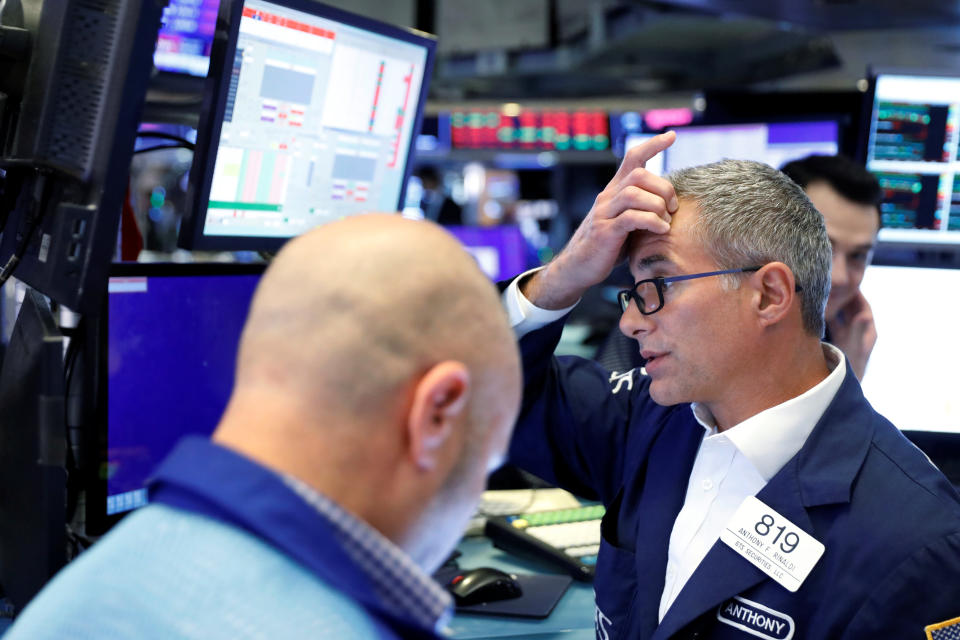Stock market news: August 26, 2019
Stocks ended higher Monday after President Donald Trump said he wanted U.S. and Chinese trade negotiators to move forward with talks. The advances helped pare some of last week’s steep losses, which came about as trade tensions simmered.
Here’s where stocks settled on Monday, by the end of regular trading.
S&P 500 (^GSPC): +1.11%, or 31.48 points
Dow (^DJI): +1.06%, or 270.81 points
Nasdaq (^IXIC): +1.32%, or 101.97 points
10-year Treasury yield (^TNX): +1.3 bps to 1.54%
Trump said during this weekend’s G7 summit in France that China called the U.S. delegation’s “trade people, and said let’s get back to the table.” He also characterized current talks as “much more meaningful than I would say at any time, frankly.”
However, the veracity of the president’s account has been called into question, according to Chinese media. Hu Xijin, the editor-in-chief for China’s Global Times, wrote in a Twitter post Monday morning that “Chinese and U.S. top negotiators didn’t hold phone talks in recent days,” adding that recent interactions between the two sides don’t have the “significance” that Trump suggested. Stock futures gave up some gains after the Twitter post.

As August rolled along, investors have faced an increasingly difficult task to try and determine the impact to corporate profits and the economy caused by an escalating trade war between the U.S. and China. That uncertainty has been reflected in volatility in equity markets, and sharp bids higher in safe havens including U.S. government debt and gold (GC=F).
Last Friday, Trump said he would unleash a higher rate of tariffs on some Chinese goods, after China earlier in the day announced plans to impose new tariffs on $75 billion worth of U.S. imports. That session marked the third 2% or greater decline in the major indices in August, setting stocks up for a second down month in 2019.
In the days since, China’s Vice Premier Liu He issued a statement saying that China “resolutely opposes the escalation of the trade war” and seeks “calm negotiations” with the U.S.
The trade war has also muddied the outlook for central bankers, who have struggled to generate economic models under rapidly shifting trade policies. In public remarks from the Federal Reserve’s annual Jackson Hole symposium on Friday, Fed Chair Jerome Powell said that there are “no current precedents to guide any policy response to the current situation.”
Market participants have largely bet on the Fed cutting rates further to stave off a potential downturn in the face of geopolitical uncertainty. But that monetary policy path may not be as easily or effectively implemented as many investors believe, some analysts have pointed out.
“The Fed has room to move, but it cannot treat every ratcheting up of the trade war as reason to keep cutting rates without regard to the medium-term inflation picture,” Ian Shepherdson, chief economist for Pantheon Macroeconomics, wrote in a note Monday. “We don’t envy Mr. Powell and his colleagues right now; all their analysis and forecasts can be upended by a single tweet, so the policymaking process has been wrecked.”
As the saber rattling of the trade war increases, many institutional investors have rotated out of certain U.S. assets, as a move to reduce exposure to firms that count China as a major part of their operations.
“Large-cap mutual funds are underweight U.S. firms with the highest China sales and have been gradually cutting exposure to these stocks since year-end 2017,” Goldman Sachs analyst David Kostin wrote in a note. “Hedge funds have also been reducing length in stocks exposed to U.S.-China trade. The share of semiconductors’ market cap owned by hedge funds fell from 4.2% in 4Q 2017 to just 2.3% in 2Q 2019.”
Other firms have echoed these sentiments, while highlighting the resilience of the domestic economy at large.
“We estimate the direct impact of all the additional tariffs will represent only a marginal drag on the U.S. economy. But downside risks are increasing for both the global economy and markets,” Mark Haefele, global chief investment officer at UBS, wrote in a note Sunday.
“As a result, we are reducing risk in our portfolios by moving to an underweight in equities to lower our exposure to political uncertainty,” he added. “We continue to favor carry strategies in credit and foreign exchange markets, which benefit from central bank easing in a low-growth environment.”

—
Emily McCormick is a reporter for Yahoo Finance. Follow her on Twitter: @emily_mcck
Read more from Emily:
Economy adds 164,000 jobs in July, unemployment rate sits at 3.7%
Netflix’s 2Q global paid subscriber additions miss expectations
Tech companies like Lyft want your money – not ‘your opinion’
Follow Yahoo Finance on Twitter, Facebook, Instagram, Flipboard, LinkedIn, and reddit.
Read the latest financial and business news from Yahoo Finance

